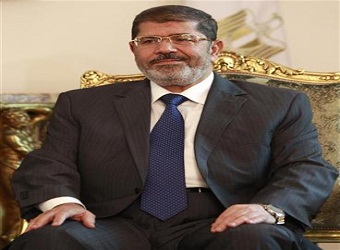The clock is ticking for Egypt’s President Mohammed Morsi to meet the demands of millions of protesters seeking his ouster and fresh elections after an ultimatum issued to the Islamist leader by his own armed forces.
If Morsi does not meet the demands by Wednesday, the military has said it will impose its own “road map” for the future.
Morsi rejected the army’s call in a statement issued at 2 a.m. local time Tuesday (8 p.m. Monday ET) by saying his administration would continue on its “previously plotted path” toward reconciliation. Violence during the protests at the weekend saw 16 people killed and hundreds injured.
Barack Obama and the United Nations have each urged Morsi to listen to his people, as a vast crowd gathered once again in Cairo’s Tahrir Square Tuesday.
Rupert Colville, a spokesman for the United Nations’ High Commissioner for Human Rights, told a briefing Tuesday that they were following the “extremely tense situation” in Egypt with “great concern.”
“We urge all political parties and social groups to urgently engage in a serious national dialogue in order to find a solution to the political crisis and prevent an escalation of violence,” Colville said.
“We call on the president of Egypt to listen to the demands and wishes of the Egyptian people, expressed during these huge protests over the past few days, and to address key issues raised by the opposition and civil society in recent months, as well as to heed the lessons of the past in this particularly fragile situation,” he added.
He welcomed assurances given by the military and law enforcement agencies that “no measures will be taken that could lead to excessive use of force against peaceful demonstrators.”
The White House said in a statement Tuesday that Obama had called Morsi on Monday, urging him to listen to “the voices of all Egyptians.”
Obama told Morsi that the United States was “committed to the democratic process in Egypt and does not support any single party or group.”
But the president also “stressed that democracy is about more than elections.”
“It is also about ensuring that the voices of all Egyptians are heard and represented by their government, including the many Egyptians demonstrating throughout the country,” the statement said.
Obama encouraged Morsi “to take steps to show that he is responsive to their concerns, and underscored that the current crisis can only be resolved through a political process,” it added.
“President Obama also underscored his deep concern about violence during the demonstrations, especially sexual assaults against female citizens,” the White House said. “He reiterated his belief that all Egyptians protesting should express themselves peacefully, and urged President Morsi to make clear to his supporters that all forms of violence are unacceptable.”
Amid the heightened tensions, the U.S. Embassy in Cairo was closed on Tuesday with regular consular service suspended. It was also closed on Sunday. U.S. citizens were advised to “avoid areas where large gatherings may occur.”
On June 28, the State Department allowed a “limited number of non-emergency U.S. government personnel and family members” to leave the country “due to the ongoing political and social unrest.”
Canada said on Twitter that its embassy in Cairo would be “closed until further notice for security reasons.”
According to an airport security source, a list has been circulated containing the names of 48 leading members of political parties, including the Muslim Brotherhood, who must now inform national security officials before leaving the country. The use of private jets has also been temporarily banned.
It remains unclear whether the Egyptian army was actually calling for Morsi to stand down, or whether it would accept some attempted compromise.
However, a statement issued by Morsi’s office complained said that it was not consulted about the army’s ultimatum and said “the presidency sees that some of the statements in it carry meanings that could cause confusion in the complex national environment.”
It added that his administration was “going forward on its previously plotted path to promote comprehensive national reconciliation … regardless of any statements that deepen divisions between citizens.”
Morsi’s office, discussing the call with Obama, said the U.S. was “working with the Egyptian leadership elected by the Egyptian people and supports peaceful democratic conditions in Egypt.”
“The president confirmed that Egypt is moving forward in a peaceful democratic transition built on constitution and law,” Morsi’s office said.
It also said that Egypt’s “democratic, civil, modern state” was “the most important achievement” of the revolution that deposed former President Hosni Mubarak.
“We will not allow Egypt with all its forces to return backward under any circumstances,” Morsi’s office said. “Egypt has paid dearly from the blood of its sons and its stability and security and its delayed the path to development, these are the high prices it paid to build a new state. We all chose democratic means as the only safest way to manage our differences of opinion.”
NBC news


